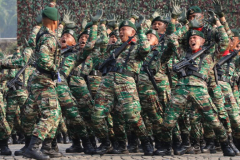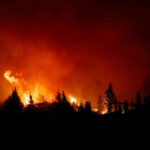- Indonesia’s president has tasked the military with combating illegal forest activities, raising concerns about human rights violations and evictions of Indigenous and local communities.
- The regulation risks criminalizing Indigenous communities while favoring large-scale corporations that exploit forests.
- Activists warn of systemic corruption allowing corporations to evade penalties while smaller actors face harsher consequences.
- The militarized approach marks a regression to authoritarian-era practices, undermining democracy and environmental justice, activists say.
JAKARTA — Indonesia’s president has drafted the military to lead the reclamation of illegally occupied forest areas throughout the country, while the Ministry of Forestry has partnered with it to protect and rehabilitate forest areas.
These have prompted warnings of a backslide to heavy-handed evictions targeting largely powerless Indigenous and local communities.
Under a regulation issued in January, President Prabowo Subianto says he aims to crack down on illegal activities inside forest areas, such as oil palm cultivation and mining. Illegal oil palm plantations alone occupy a combined forest area of 3.37 million hectares (8.33 million acres), larger than Belgium, and account for a significant portion of oil palm output in Indonesia, the world’s top producer of the commodity.
But activists say this new presidential regulation only adds to the woes of Indigenous and forest communities, with plantation companies having little to fear from it. Uli Arta Siagian, forests and plantations lead at the Indonesian Forum for the Environment (Walhi), the country’s biggest green NGO, pointed to the long history of authorities cracking down on small farmers and Indigenous communities farming a handful of hectares, instead of corporations running industrial-scale plantations.
She said the regulation appears to make no distinction between large-scale corporate activities with those of local communities, including Indigenous peoples who have historically faced tenure conflicts due to unilateral forest area designations.
This approach further risks criminalizing communities engaged in subsistence activities within forest areas, she said.
“Judging from the long history of this country, it is easier to regulate, evict and seize people’s land than to reclaim forests and lands that have been illegally or legally but illegitimately controlled by corporations,” Uli said.
The risks are worsened by the lack of legal recognition for Indigenous land rights, despite communities having lived on these lands long before Indonesia’s independence in 1945, activists say. They also often lack the resources needed to legalize their land claims, unlike companies, making them even more vulnerable to forced displacement, said Adam Putra Firdaus, a researcher at the Indonesia Center for Environmental Law (ICEL).
“Companies have lots of resources and money to hire lawyers, but not locals who live in forest areas,” Adam said.
Companies in Indonesia also often have political connections, unlike communities, giving them ways to escape penalties through backdoor deals.
One of the most notorious corruption cases in the palm oil industry involved tycoon Surya Darmadi, who was convicted in 2023 for illegally clearing forest areas. Surya was able to do so by colluding with government officials to secure permits and avoid penalties.
Despite regulations prohibiting plantations in areas zoned as forest, Surya Darmadi’s companies operated for years without repercussions, thanks to his collusion with and bribery of government officials.
The case is emblematic of broader systemic issues where large corporations often evade accountability, while smaller actors, such as Indigenous communities, face harsher consequences, activists say.
The Attorney General’s Office last year launched an investigation into alleged corruption in the Ministry of Forestry, related to the ministry’s handling of illegal plantations in forest areas. The investigation suggests that ministry officials might have colluded with businesses to reduce fines for their illegal activities, said Ahmad Zazali, head of the Center for Law and Conflict Resolution (PURAKA).

Militarized forest governance
Prabowo’s presidential regulation establishes a task force to oversee the military’s role in fighting illegal forest activity. The task force is dominated by military, police and intelligence officers, and led by the defense minister, Sjafrie Sjamsoeddin, a former military general.
This suggests Prabowo, also a former military general, intends to militarize forest governance, activists say. They warn that a shift from a forest governance framework administered by civilian agencies, to a militaristic approach could give rise to human rights violations if military or police actions are used to remove communities perceived as encroachers.
That’s because the new regulation explicitly allows for the state to seize forest land deemed unlawfully occupied. But the risk of conflict between the military and local and Indigenous communities in forest areas are especially great given that the military has a history of violent land conflicts in forested regions like Papua.
And since the government has various agricultural and infrastructure projects that need vast areas of land, it’s likely the military will be used to evict settlements and farms run by communities within forest areas through the new regulation, Uli said.

Corruption vs. transparency
The flip side of authorities’ tendency to crack down on powerless groups is that they’ve been largely lenient toward powerful corporations and individuals — something that’s unlikely to change under the new regulation, said Made Ali, a legal expert with the NGO Senarai.
Given the endemic corruption in Indonesia, thes





